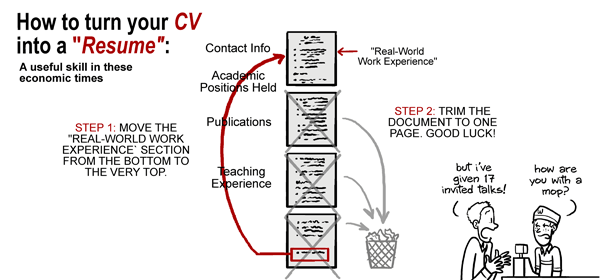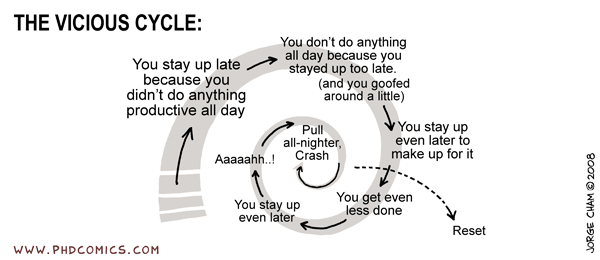In this post, I'll describe some of what I went through. I know I am not the only one that has left academia, nor will I be the last. I think this may be of help to people passing through the same situation.
Academia: Where I Was
First of all, let's get straight what I mean by academia, particularly since I see a lot of misinformed people when I tell them my intentions. The traditional academic career path is exceedingly simple: you go to grad school and get your PhD, you proceed to ~3-6 years of postdoc positions, and then, if you're lucky, you'll land a faculty position. Some variations are possible, particularly if you lean more towards research or education or have the right connections, but in general the path is straightforward. Throughout this you'll be doing independent research pursuing either your own interests or those of your supervisor, specializing ever more in your field.
There are some clear benefits in being a postdoc in pursuit of an academic career. Your hours and schedule are usually quite flexible, you can have a lot of freedom in what you research, and, depending on your field, you can end up traveling to exotic places for conferences or field work. However, this comes at a cost. The postdoc career is temporary and short, typically 2-3 years. After that time, the postdoc typically has to move, sometimes even change country, to another temporary position just to pursue their career. There is very little job stability and not enough permanent positions available. In fact, not all postdocs will (or even can) become faculty (see, for example, this link).
Academic work can be quite stressful as well. While you don't have fixed hours, you are still expected to publish regularly. This can lead to unhealthy pressures on your work/life balance. Even if you follow a 8-5 schedule, it is not uncommon to feel as if you are not working hard or fast enough. While it's not unusual for many types of jobs to work evenings or weekends, these are frequently considered overtime and not strictly required, whereas in academia it is more often the norm. Add to that the need to move institution/state/country every 2-3 years and you have further pressures against you, especially if you have a partner or family.
Finally, the job hiring process is somewhat different in academia. There are websites, such as the AAS Job Register, which lists many of the jobs available. In the US, many of these are due October through December, for positions starting the next year in September. You can easily find yourself applying for temporary positions that will require you to repeat the process over and over, year after year. There are very few guidelines for those of us who start thinking about doing something other than academia, though that has started to improve in the last few years with, for example, workshops and networking activities hosted at conferences like the AAS meetings.
In the end, academia is a personal choice. Some people enjoy it and its quirks; others find a way to balance out the bad with the good. Unfortunately, the current state of training in graduate school (and beyond) almost exclusively points towards the academic path. As for me, I certainly enjoyed some aspects of academic research, but decided that it was not something I should pursue in the long run.
The Job Search: Where I Am
I am halfway through my 4th year as a postdoctoral researcher in Chile. I started under one grant and got a fellowship that extended this until the current year. During my postdoc, I've had the opportunity to visit many of the world-class telescopes here in Chile and have traveled to many other countries for conferences and for brief vacations. I've made good friends and have had many pleasant experiences here. I've also been frustrated, depressed, stressed out, and felt like an impostor from time to time. In short, life has been life: some ups, some downs.
One of the advantages of being an astronomer in Chile is the telescope access. Though for me this started slow, it sped up in the later years and quickly overwhelmed me with the amount of data I was getting. I reached the point where I felt my two main duties were writing proposals to go to the telescope, then going to the telescope so I could plan the next round of proposals. There were so many observing nights that I felt like a bad astronomer because I wished clouds or technical problems would let us close early. Still, I kept accumulating data and decided I would just deal with it later. In particular, I realized that as a faculty I could just get some students to work on it. The students would do the data reduction and analysis and I would interpret and publish the results. Problem solved!
In hindsight, there are flaws in this as you can probably tell. The main one being that I was treating a faculty position as a way to escape doing most of the work that I was supposed to be doing. This is not the correct mindset for pursuing an academic career at all. Nevertheless, I was blind to this and when job season came around I dutifully applied to postdoc and faculty positions.
Applying for academic jobs is not easy. You pretty much put your research on halt so you can craft a good proposal of what you will do over the next few years, not to mention making sure your cover letters are tailored to the job and letters of recommendation get sent in time. After you send all that in, it's months of waiting and usually only silence for a response. This past job cycle I knew something was wrong with me because I was just rehashing old content and didn't put that much effort in several applications. I felt pessimistic about my job prospects, despite writing or co-authoring 19 publications and so many years of experience.
In January I attended the AAS meeting, as I do almost every year. It is a great place to catch up with friends and both see the latest in the field and get career advice. Despite having a few informal interviews for both postdoc and faculty positions, I felt this would be the end of my academic career. My friends cheered me up and presented teaching as a viable alternative. This sounded very appealing and my enthusiasm was revitalized. After the meeting, I focused only on submitting applications for teaching-centric positions.
Then it happened. I got a specific request for a faculty interview. This was the 2nd or 3rd I received, but somehow at that moment, my heart sank. I had been avoiding thinking about the future, despite having a postdoc offer on the table, but that instant confronted me with the truth: I did not want to be an academic professor.
Exactly why is hard for me to say. I like astronomy and certain aspects of my research, like talking about the results, managing and interpreting my table of candidate young stars, and making plots and figures. I don't like the tediousness of data reduction (who does?), the seemingly endless proposal cycle, the instability of the job, the work/life balance, and how narrow my expertise appeared to be.
The Future: Where I Am Going
So now what do I do? This has weighed heavily on my mind this past month and especially the first few weeks after I made my decision. I informed some friends and collaborators and received, in general, very positive support. I've identified three possible career paths I could take, though I know many more options may exist.
Teaching. This is a straightforward alternative that I realized I could do back at AAS in January. I already have extensive knowledge in physics and astronomy and many people have to take some science courses as part of their college education. Seems like a viable thing to do and several places I've applied to are certainly teaching-focused.
Writing. I tend to write a lot (see this blog and the average length of its articles). I'm not too sure I would pursue a career in journalism, but the ability to communicate effectively in written form is certainly valuable across many professions. I have a friend who worked as an astronomy editor and that intrigues me as well.
Analysis. One of the growing industries in the US is that of data science. This is a very broad subject encompassing many diverse skills. Some key words I've seen are data mining, SQL, and Python, which are all tools and skills I already possess. This is the avenue of work I'm currently pursuing; first attempting to narrow down where in the data science spectrum my skills lie.
It is a frightening aspect to leave a career I've worked so hard on, but I realize I would be happier elsewhere. Faculty positions are scarce and it seemed the best thing to do was to make this decision now and embark on a new journey. Where that journey ends, I don't know, but I'm hoping it will be for the better.
What does this mean for this blog? Nothing for right now. The title "Strakul's Thoughts" is broad enough to cover whatever I want to. I still plan to have some astronomy articles, particularly since I'll be going to the Young Stars conference in Atlanta in a few weeks and want to comment on that. I have some cool results I'll be presenting there that I may summarize here, too. The book reviews will come naturally as I continue my hobby and may end up forming the main focus of the blog.
Thanks for reading thus far. Wish me luck and success!
If you have advice or comments, feel free to leave them down below. I'm sure they'll benefit not only me, but any other readers who may be going through similar decisions.
 |
| Image source: www.phdcomics.com |


No comments:
Post a Comment
Note: Only a member of this blog may post a comment.